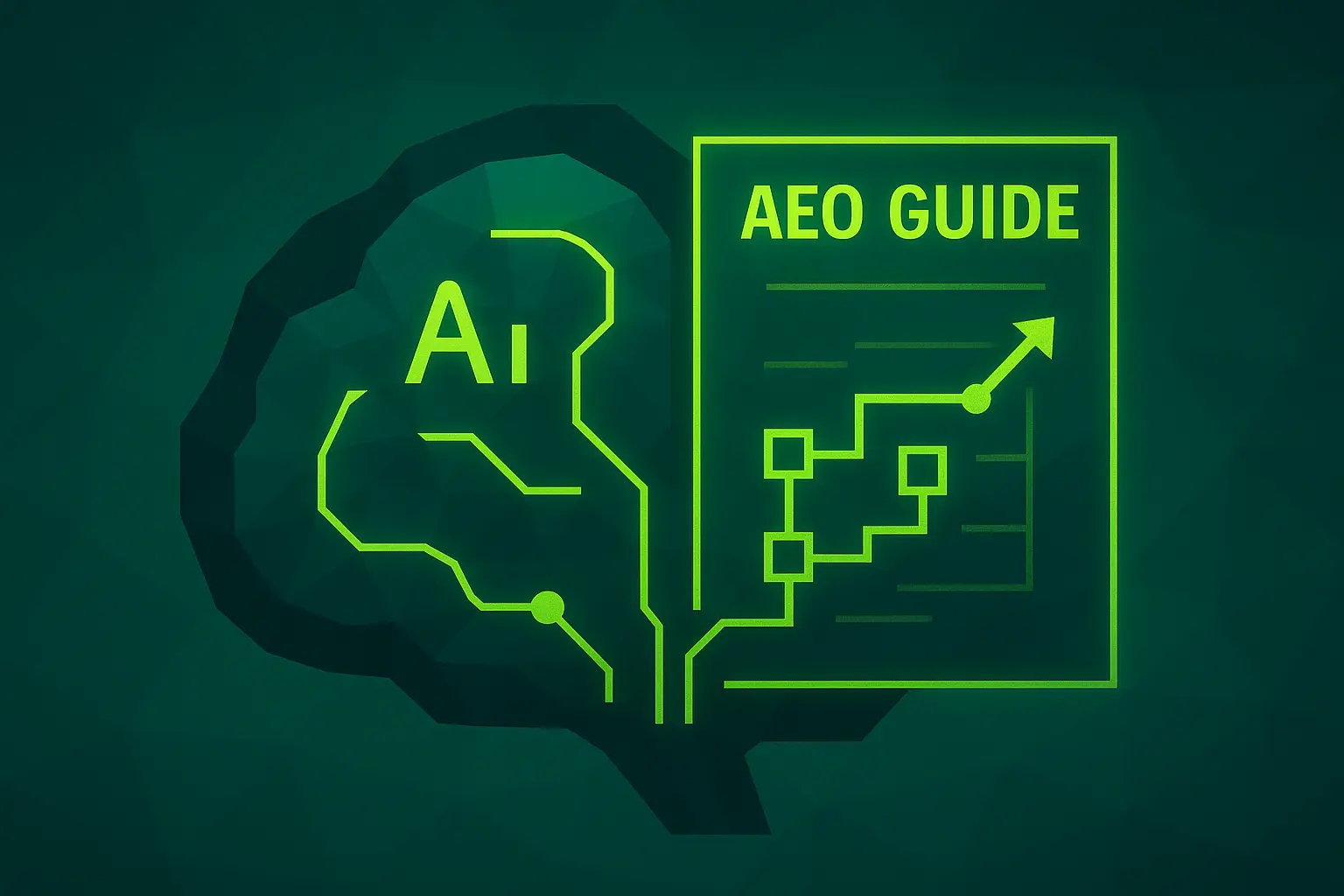Answer Engine Optimization (AEO): A Complete Guide

AEO is the practice of crafting answer-first, well-structured, and well-sourced content so AI answer engines select and cite your pages in responses. It uses clear formatting, schema markup, and authority signals to earn inclusion in Google AI Overviews, Bing Copilot, and Perplexity, complementing traditional SEO.
Key Takeaways
- Write answer-first content with clear headings.
- Add FAQPage or QAPage schema where relevant.
- Strengthen E-E-A-T with bylines, citations, and updates.
- Earn authoritative backlinks and mentions.
- Track citations and AI referrals alongside SEO metrics.
Table of Contents
What is Answer Engine Optimization (AEO)
Answer Engine Optimization is the practice of shaping content so AI-driven answer systems like ChatGPT, Claude, Perplexity, Gemini, and other LMM tools select and cite it as the response to a question.
Why AEO matters
Google describes how AI Overviews summarize topics and link to sources for deeper reading, and explains AI features for publishers in Search Central. Microsoft explains that Copilot Search in Bing gives summarized answers with cited sources and reiterates this in its Copilot Search announcement. Perplexity’s Publishers Program emphasizes citations by design.
How answer engines work at a high level
Large language models retrieve web content, synthesize an answer, and attach links. Clear formatting and obvious answers increase the odds of being selected.

Core components and best practices
Intent mapping and question focus
Build pages around the exact questions users ask. Lead with a plain-language answer, then support it with detail. Tools that surface real questions, such as AlsoAsked, help you assemble a question set.
Structure and formatting for AI
Use direct definitions, scannable headings, short paragraphs, and a brief summary or table when helpful. These patterns make extraction easier for answer systems, as covered in Search Central’s AI features guidance.
Schema markup and structured data
Mark up FAQs with FAQPage and Q&A hubs with QAPage. Google states that structured data can aid rich results, though display is never guaranteed.
Expertise, authority, and trust
Demonstrate experience, cite sources, and publish bylines. Google outlines E-E-A-T in its guidance on helpful, reliable, people-first content and in the Quality Rater Guidelines update.
Freshness and updates
Keep pages current and show “last updated” where appropriate. Google notes that AI Overviews aim to help with complex queries and link out for more, as described in the AI features documentation.
Backlinks and citations
Authoritative links still matter. Microsoft stresses citations in Copilot Search, and Perplexity underlines source credit in its Publishers Program.

Step-by-step implementation
Audit your content
List current pages. Identify questions you already answer and gaps to fill. Use tools that surface “People Also Ask,” such as AlsoAsked or Answer The Public.
Research real questions
Collect questions from search results, customer support, and forums. Prioritize by strategic value and where you can provide the clearest answer. Guidance on answer-first content appears in SEO.com’s AEO guide.
Write answer-first pages
Open with a two-to-three sentence answer. Follow with concise sections. Add a short summary or key takeaways.
Add schema markup
Implement FAQPage where you host a list of Q&As, and QAPage for community-style Q&A. Validate in Search Console and test with Rich Results Test.
Strengthen E-E-A-T
Publish bylined articles, author bios, and references. Align with the guidance on helpful content and E-E-A-T.
Promote and earn citations
Pitch your definitive resources to relevant publications. Since answer engines cite sources, visibility in respected outlets improves your chances, as seen in Copilot’s citation approach and Perplexity’s policy.
Monitor and iterate
Track appearances of your brand or URLs inside AI answers. Compare referral traffic from these engines, and expand successful formats. Google outlines AI features for sites in Search Central.
Measurement
Create a simple scorecard: citations earned, answer inclusions, brand mentions, and traffic from AI features. Use these as leading indicators while traditional SEO metrics continue to run in parallel.
Challenges and cautions
Tooling for AEO is early. Do not rely only on schema or over-optimize thin content. Maintain editorial standards in line with Google’s helpful content guidance. Keep review cycles to update facts and figures. Given these complexities, many businesses choose to partner with specialists.
As an experienced digital marketing agency and SEO company, we help brands adapt their strategies for both search engines and AI-driven answer systems. Our SEO and AEO services are designed to navigate these challenges and secure your brand’s visibility in AI-powered search results.
Outlook
Search is adding AI summaries and answer panes. Google’s AI Overviews documentation, Microsoft’s Copilot Search pages, and Perplexity’s emphasis on citations show a clear direction that rewards structured, credible, and helpful content.

